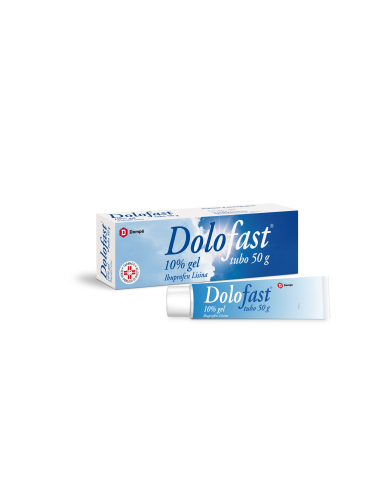Your cart
There are no more items in your cart
- 17%
Muscle pain Dolofast gel 50g 10%
 100% secure payments
100% secure payments





DOLOFAST 10% GEL TUBO 50 G
active ingredients
100 g gel contains: Active ingredient: Ibuprofen salt of lysine (4-isobutil-fenil-2-propionate of lysine) 10 g Excipients with known effects: methyl-p-hydroxybenzoate, ethyl-p-hydroxybenzoate For the list of excipients see paragraph 6.1Excellent
Isopropanol, hydroxyethylcellulose, methyl-p-hydroxybenzoate salt sodium, ethyl-p-hydroxybenzoate salt sodium, glycerin, lavender essence, purified water.Therapeutic indications
Dolofast gel is indicated in the local treatment of contusions, sprains, myalgies, muscle tears, torcicollo.Contraindications
Hypersensitivity to the active ingredient or any of the excipients listed in the section 6.1. For the possibility of cross-sensitization, the product should not be administered to patients in whom acetylsalicylic acid or other non-steroidal anti-inflammatory drugs (FANS) have caused hypersensitivity reactions (such as bronchospasm, asthma, rhinitis, hives) or other allergic manifestations. The use of the product is contraindicated in the third trimester of pregnancy. In children under 12 years.Population
We recommend 2-4 applications per day on the part dolorante.Non exceed the recommended doses, especially older patients should comply with the above minimum dosages. Pediatric population Do not use in children under 12 yearsConservation
Nothing to reportWarnings
It is appropriate to avoid the application of Dolofast gel in correspondence of open wounds or continuous injury of the skin, avoid contact with eyes, lips, mucosa. Do not use for occlusive medications. Only for external use. Prolonged species use of topical medicines can give rise to local sensitization and irritation. In this case stop treatment and consult your doctor to establish suitable therapy. After a short period of treatment without appreciable results consult your doctor or pharmacist. In patients who use ibuprofen that suffer or have previously suffered from bronchial asthma or allergic disease may occur bronchospasm. Although the systemic absorption of ibuprofen applied locally is lower than that of oral dosage forms, some complications may occur in rare cases: - gel should be used with caution in patients with impairment of kidney function or kidney failure anamnesi. NSAIDs for topical use were associated with kidney failure. - gel must be used with caution in patients with impairment of liver function. - patients with an active history or a history of peptic ulcer, intestinal inflammation or hemorrhagic diathesis should consult a doctor before using this product. To avoid any phenomena of hypersensitivity or photosensitization avoid exposure to direct sunlight, including solarium, during treatment and in the next two weeks. Wash thoroughly and prolonged hands after each applicationInteractions
You should consult your doctor in case of concurrent treatment with anticoagulants. Non-steroidal anti-inflammatory drugs can interact with antihypertensive drugs and can possibly increase the effects of anticoagulants, although the possibility that one of them occurs with a topical preparation is extremely remote. Concurrent use of acetylicylic acid or other NSAIDs can cause increased incidence of adverse reactions.Effects
Undesirable effects can be minimized with the use of the lowest effective dose for the shortest possible duration of treatment needed to control symptoms. Systemic availability of topical ibuprofen is very low compared to the NSAIDs administered by mouth. The most frequently reported side effects are reactions to the application site. The side effects are described according to the classification for systems and organs according to MedDRA and based on the frequency estimated by post-marketing experience. The frequencies are defined as follows: very common (≥1/10); common (≥1/100,Overdosing
Overdose with top presentations of ibuprofen is extremely unlikely. Severe overdose symptoms of ibuprofen (e.g. as a result of oral ingestion of the drug) include headaches, vomiting, drowsiness and hypotension. It should be taken into account to take appropriate corrective measures to control any electrolytic disorders.Pregnancy Although in the studies carried out in this regard no particular effects were observed with the use of ibuprofen, ibuprofen should be avoided during the first and second trimester of pregnancy. During the third trimester of pregnancy, the use of ibuprofen is contraindicated. Nursing: Ibuprofen passes into breast milk at very low concentrations. However, the use of the product during lactation is not recommended. Fertility: No effect observed at this level of exposure.
Source: Farmadati
- Deductible product
- Yes
029775018
New
No reviews

